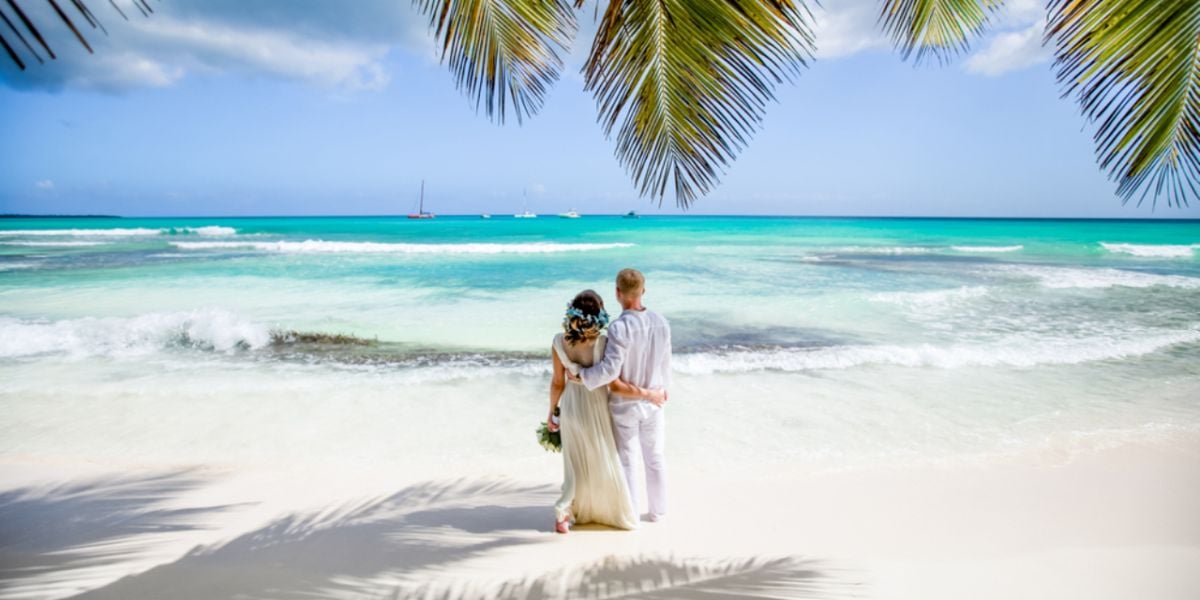
If you are wondering what it's like to get married in the Dominican Republic, this article is for you.

It is no secret that for most Dominicans, getting legally married might not be an option; only when a Dominican sees true value do they get married. Most of the time, getting married in the Dominican Republic means just moving together.
If you hear someone say “he/she got married”, chances are they just moved together with someone.
However, for the Dominicans who are well organized, who really want commitment, or who have a strong religious point of view, getting married implies signing off those papers.
Moreover, from the Dominican point of view of the law, if you are living with someone (not officially married) for 2 years or more, and you decide to separate, or there is a death involved, the law protects you depending on the heritage and pensions.
The Constitutional Court of the Dominican Republic (TCRD), through File No. TC-05-2019-0065, acknowledges that de facto relationships create rights. Furthermore, as a predominant element, the TCRD has reiterated the pension entitlement for the widow and children of the deceased, in accordance with Article 55, numeral 5 of the Dominican Constitution, which establishes that "The singular and stable union between a man and a woman, free from marital impediment, forming a de facto household, generates rights and duties in their personal and patrimonial relationships, in accordance with the law". Churches are tasked with assessing the legal eligibility of couples, as the law prohibits same-sex marriages and marriages involving individuals under 18 years of age. Additionally, churches are required to register all marriages in the civil registry within three business days following the ceremony.
Marriages in the Dominican Republic typically fit into one of two categories:
Civil marriages involve the parties registering the marriage directly with the Dominican government. The individual overseeing the wedding ceremony is usually a government official, often a notary public. The couple may decide whether to have a separate religious ceremony or not;
Canonical marriages are conducted by a Roman Catholic priest. After the ceremony, the church is responsible for registering the marriage with the relevant Dominican government authorities.
Marriages conducted within religious denominations other than Roman Catholicism are fully recognized and allowed under Dominican law.
There is also a dark side of the story when it comes to getting married in the Dominican Republic; there is a 9% chance of child marriage by 15 years old, not legally, but living together in a house performing the same task as an adult wife, even having children at a very young age.
In the Dominican Republic, there exists a traditional expectation for women to fulfill the roles of wives and mothers, while men are expected to be providers for the family. These entrenched gender norms often lead to a pervasive acceptance of early marriages and unions. Consequently, adolescent girls as young as 15 may face pressure to enter into marriages or unions at an early age.
In addition to education, poverty significantly influences the prevalence of child marriage in the Dominican Republic. Among women who did not pursue secondary education, 67% of the poorest individuals in rural regions entered into unions before turning 18, compared to 64% in urban settings. Conversely, these figures decrease to 31% and 56%, respectively, for women from wealthier households with similar educational backgrounds. Some parents opt to marry off their daughters to alleviate what they perceive as a financial strain on the family.
For some girls and adolescents, marriage may appear as a means to flee from domestic violence. Nonetheless, entering into an early marriage or union exposes them to a heightened risk of abuse by their new spouses. According to the Experimental Survey on the Situation of Women conducted between 2017 and 2020, findings from 2018 revealed that 27% of women encountered violence, including 11% experiencing economic violence, 24% enduring psychological violence, 4% suffering physical violence, and 1% facing sexual violence perpetrated by a current or former intimate partner.
The Dominican Republic is among the countries where UNICEF, UNFPA, and UN Women collaborate under the Latin America and the Caribbean Joint Programme for a Region Free of Child Marriage and Early Unions (2018–2021). The program aims to synchronize national frameworks with global standards, empower girls and adolescents, advocate for policies and services addressing the factors contributing to child marriage and early unions, and foster national and regional dialogue to eliminate silence on the issue.
Marriage requirements between expats
In order to facilitate the preparation of the marriage certificate, it is necessary to provide the following documents to the Civil Status Office prior to the ceremony; these requirements are for expats:
- Copy of the identification page and original passport, along with the information on the last entries you have made to the Dominican Republic;
- Marital status that proves that the couple are both single at the moment or they need to show affidavits;
- Birth certificates must be original;
- If there was any divorce on any of the parties, they need to show divorce certificate(s) or death certificate(s), if needed;
- Two or more witnesses with valid passports, other than family.
For expats, if their birth certificate and passport are in Spanish and they state they are single, they do not need to provide a single status certificate. Otherwise, they should obtain a single status certificate from the Civil Registry of their country of origin or residence.
All documents provided by foreign individuals must be legalized and apostilled in their country of origin. If their country is not part of the Hague Apostille Convention, the single-status certificate must be legalized by the Dominican consular authority where it was issued.
If the documents are not in Spanish, they must be translated by a certified interpreter and legalized by the Attorney General of the Republic and the Ministry of Foreign Affairs. In some cases, translation services are available at the Dominican Consulate. Some accredited diplomatic delegations in the Dominican Republic accept single-status declarations from their citizens. If the citizen's country does not have diplomatic relations with the Dominican Republic, the declaration can be made before a Dominican notary public and legalized by the Attorney General of the Republic.
Italian citizens must have marriage bans posted visibly at the Civil Registry office at least 3 days before the wedding date; the publication cannot be waived. A certificate confirming this will be issued.
Marriage requirements between Dominicans
- Identification cards of the marrying individuals;
- Divorce decree (if previously married). Cost of the extract of the decree: RD 400 pesos (USD 6.81);
- Death certificate (if either party is a widow or widower). Cost of the extract of the certificate: RD 400 pesos (USD 6.81);
- Birth certificates of the married individuals. Cost of the extract of the certificate: RD 400 pesos (USD 6.81);
- At least two witnesses. Among the witnesses, at least two cannot be immediate family members or relatives up to the third degree of the marrying individuals;
- If they have children together, birth certificates (these must be previously acknowledged). Cost of legitimization: RD 700 pesos (USD 11.92);
- If the couple intends to marry under the legal regime of separate property, it is mandatory to submit an authentic document to the Civil Registrar specifically drawn up for this purpose. This document must be registered and duly notified prior to the marriage ceremony.
Same-sex marriage in Dominican Republic
While the Dominican Republic has made strides in enacting inclusion laws, same-sex marriage remains prohibited by Dominican law. Whether it's marriage in a civil ceremony or a domestic partnership, regardless of the duration of their relationship, there is no legal recognition or provision of benefits for gay or lesbian couples.
Nevertheless, this does not deter many gay or lesbian couples from living together openly. In the past, such a lifestyle was uncommon within the community. However, today, an increasing number of gay or lesbian couples embrace an open lifestyle, where they cohabit, express affection, and socialize together in public spaces.
More and more Dominicans are accepting the LGBTQ+ lifestyle as normal.
Religious ceremonies in the Dominican Republic
Individuals desiring a religious ceremony in the Dominican Republic's idyllic setting can turn their dreams into reality. The primary prerequisite is to secure authorization from an archbishop in the couple's country of residence and submit it to the local Dominican archdiocese. The required documents include:
- Pre-matrimonial certificate;
- Certificate of civil marriage legalized by the Dominican Consulate, in case the couple has already married in their country of origin;
- Baptism certificates, if applicable;
- Church annulment certificate(s), if applicable.
Fees needed to register a marriage in the DR
- For couples where both the bride and groom are non-residents of the Dominican Republic, the fee is RD 20,000.00 (USD 340.71);
- If only one partner is a non-resident of the Dominican Republic, the fee is RD 10,000.00 (USD 170.35);
- For couples where both the bride and groom are residents of the Dominican Republic, the fee is RD 3,000.00 (USD 51.11);
- For couples where both the bride and groom are non-residents of the Dominican Republic, the fee is RD 20,000.00 (USD 340.71);
- If only one partner is a foreigner and not a resident of the Dominican Republic, the fee is RD 15,000.00 (USD 255.53);
- For couples where both the bride and groom are foreigners and residents of the Dominican Republic, the fee is RD 10,000.00 (USD 51.11).
Bachelor/hen parties in the Dominican Republic
Now that you know a few things about getting married in the Dominican Republic, let's discuss some information about farewell parties.
Farewell parties are very common in the Dominican Republic for those who get formally married. Depending on the budget, you can actually have a very high quality, all-package farewell party that goes from a trip in a boat at Punta Cana Beach with drinks, amenities, male or female dancers, naughty games, funny cakes, disco club, buggy, zip lines, safaris, if you ever thought about it, you can find it.
You can have the best luxury party at a reasonable cost, or you can have a simple party at any bar, disco club, or even villa at a lower price.
There are several companies that offer everything you need to celebrate your wedding, honeymoon, or bachelor/hen party.
There are some companies that you can call to bring decorations and very good-looking male or female dancers to make your party experience fun.
Honeymoon in the Dominican Republic
After the wedding, the best is yet to come. Having your honeymoon in the Dominican Republic can be a dream come true. Stunning beaches and premier resorts are just a couple of compelling reasons to contemplate a honeymoon in the Dominican Republic.
The options are endless, depending on how much you are willing to spend to have a very romantic and awesome memorable honeymoon.
Keep in mind that December to April is peak season at the resorts, the weather is also better during these months.
The best time frame to celebrate your honeymoon in the DR is within 7 days; if you decide to spend more than that, chances are you will run out of activities and money, or you might get bored, depending on your personality.
It's advisable to plan ahead and outline your preferences for your wedding in the Dominican Republic. Establish a budget based on your desired arrangements. You can explore the links provided below for further details and assistance:
We do our best to provide accurate and up to date information. However, if you have noticed any inaccuracies in this article, please let us know in the comments section below.








